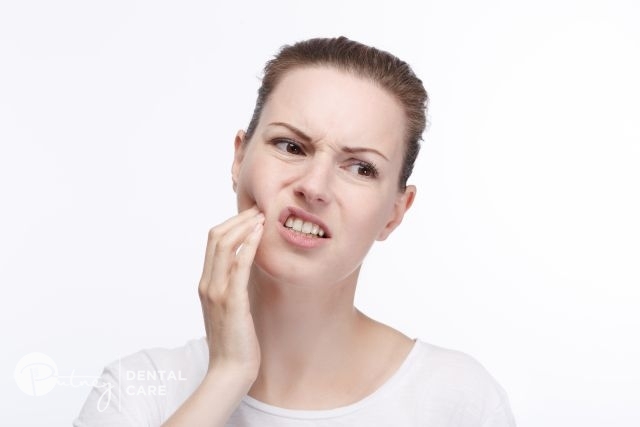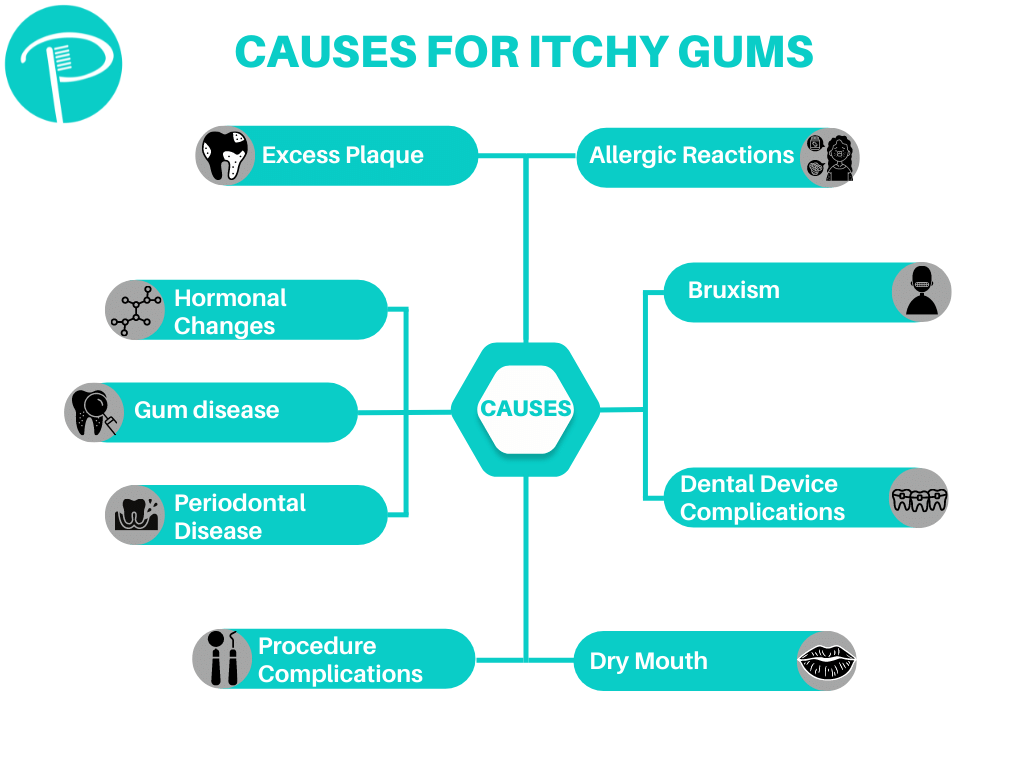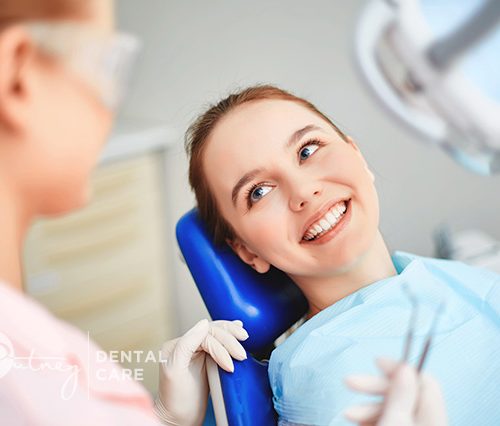Why Do I Have Itchy Gums? Causes and Treatments

Our mouth is lined with two rows of teeth that help us bite, chew, and digest our food. Gums, also known as gingiva, are important connective tissue that anchors our teeth in place and covers their roots.
If you are experiencing itchy gums, it could indicate a range of medical conditions, including plaque accumulation, gingivitis, or hormonal imbalances, which may need to be treated by a dentist.
What Do Itchy Gums Feel Like?
Itching is generally described as an irritating, ticklish sensation like something is crawling on your skin, which causes you to want to scratch, rub or lick the affected area to get rid of that feeling.
Itchy gums can also become swollen, red, sore and generally painful, either through some underlying medical condition, due to irritation from scratching or touching the area, or because of poor oral health or not seeing a dentist regularly.
Why Do We Itch?
Scratching itches is something we have done since before we were conscious of it, but why do we do it? Itches are irritations on your skin, and we are so aware of them because it is in our evolutionary interest to be aware of potential intruders like bacteria, ticks, or other creepy crawlies.
Your skin (and gums) have nerve cells that monitor itchy feelings. When we scratch, we override the itchy sensation with a new sensation of mild pain (albeit self-inflicted).
Why Are My Gums Itchy?
There can be many reasons why you may experience itching sensations in your mouth. Itching is an irritation of the nerve cells in your skin and can be caused by dry or irritated skin, central nervous system damage like shingles or stroke, psychogenic factors such as anxiety or stress, or chemicals and medications which cause build-ups of toxins.
However, in gums, the most common cause is poor oral health, plaque build-up, and inflamed gums, as well as the following dental conditions, disorders, and accidents:
- Allergic reaction
- Bruxism
- Dental device complications
- Dry mouth
- Excess plaque
- Hormonal changes
- Gum diseases
- Periodontal disease
- Procedure complications

Allergies
While it is common for an allergic reaction to cause breakouts, rashes and hives on the visible parts of the skin like the arms and neck, it is also possible for allergies to cause swelling, redness and itchy sensations to the gums and around the mouth. This is called oral allergy syndrome.
Just like other allergies, this syndrome is highly individualistic. Still, common oral allergens include raw fruits, kiwi fruit, carrots, celery, pitted fruits and stone fruits, tree nuts, melons, oranges, and tomatoes.
Bruxism (Teeth Grinding)
Bruxism refers to teeth grinding, which can damage teeth, wear away enamel, and cause receding or itchy gums due to constant friction. Teeth grinding in adults is usually due to stress or simply a mouth reflex during sleep. Meanwhile, child teeth grinding is more commonly due to misalignment of teeth, earache, or teething (although stress is possible). In advanced cases, bruxism can cause sore, red, painful, and itchy gums due to irritation and movement and structural changes.
Dental Device Complications
Braces and retainers are great for aligning teeth. However, they can sometimes irritate gums, causing pain and itchiness. You must ensure that your retainers fit properly and that you are cleaning them regularly as part of your dental hygiene maintenance.
If you continue feeling pain or itchiness, book an appointment with your dentist to figure out what is going on! It is also important to note that some people experience an itching sensation during the first few days or weeks of removing braces. This should go away after a few weeks once the teeth are aligned.
To distinguish between the two, check for redness, swelling, or cuts on your gums or inside your mouth.
Dry Mouth
Just like dryness can cause itchiness on your body’s skin, dry mouths can also cause your gums to itch.
A lack of saliva can cause a dry mouth due to dehydration or poor diet. However, some medications cause dry mouth, such as analgesics, anti-anxiety medication, antidepressants, and antidiarrheals.
To keep your mouth lubricated, ensure that you drink enough water, limit dehydrators such as alcohol and caffeine, and chew gum to stimulate saliva.
If these don’t work, check the side effects of your medication, try a mouthwash designed for dry mouths, or see a doctor or dentist for advice on maintaining healthy gums.
Hormonal Changes
Hormonal imbalances can affect many parts of your body, including causing itchy gums. Typically, this is more common amongst women due to increases in oestrogen and progesterone.
Whether experiencing menstruation, puberty, menopause, or pregnancy, hormone changes can lead to oral symptoms such as itchiness, pain, and sensitive gums.
Excess Plaque
Almost everyone will experience some form of dental plaque build-up over time. This is why we go for regular check-ups: to get a professional clean and have all plaque removed often.
Plaque is a sticky film found on your teeth that can potentially harden into an off-white or yellow substance known as tartar.
Severe tartar and plaque build-up can lead to serious gum diseases and teeth problems such as cavities, gingivitis, and periodontal disease (which will be discussed below). Even in its early stages, mild plaque can irritate the gums and cause them to be sensitive, painful, or itchy and must be fixed with a deep cleaning.
Gum Disease
As mentioned above, poor oral health and the development of plaque and tartar can lead to a whole host of mouth diseases. Gingivitis commonly causes gum irritation, sensitive guns, jaw pain, swelling, bad breath, and itchy gums.
Periodontal Disease
Meanwhile, periodontal disease (or periodontitis) is a more serious infection of the gums. Periodontal disease leads to the damage of the soft tissue and bone in your gums, causing extreme inflammation, irritation and itchiness.
In its advanced stages, periodontitis damage is irreversible. However, through expert dental work, the disease can be stopped from spreading, and procedures such as crown lengthening, pocket elimination, tissue grafting, or traditional scaling can be used to try to fix the damage.
Procedure Complications
You may also experience itchy gums following medical procedures like a tooth removal or an invasive procedure like a root canal treatment. Not only can your gums feel inflamed, swollen or itchy after successful treatment, but they can be even worse if complications from the procedure lead to urgent dental problems like toothaches, bone infections, or severe pain.
It is common to experience some discomfort in the gums and jaw following tooth extraction or wisdom teeth removal (once the anaesthetic wears off), which can be dealt with by over-the-counter pain medication. However, if the pain, discomfort or itchiness in your gums feels more extreme, this may be a sign that you should seek urgent treatment.
How to Prevent Itchy Gums
Proper dental hygiene, good oral cleaning routines, and regular trips to your dentist are the key components to avoiding swollen, red, painful, or itchy gums.
By ensuring you brush your teeth with a good brush, employ good technique, floss, and use mouthwash, you may be able to make your gums stop itching altogether. It is also essential to inspect your mouth (particularly the back of your teeth where plaque and tartar commonly build-up) and get regular dental cleans and check-ups.
How to Treat Itchy Gums
If you have itchy gums, you likely need professional treatment from a general or specialist dentist (depending on the specific cause). A dental trip for itchy gums relief may involve cleaning the gum line and endeavouring to remove severe tartar build-up from the teeth and gums.
However, there are a few simple ways to relieve your itching gums at home while you wait to see your dental specialist.
Home Remedies for Relief
However, there are a few simple ways to relieve your itching gums at home while you wait to see your dental specialist. Some home remedies for gum relief include:
- Hot or cold compress for pain relief.
- Gargling with salt water.
- Herbal pastes using cloves and turmeric.
- Essential oils using cloves, peppermint and oregano, which all have anti-inflammatory properties.
- Over-the-counter medication such as Tylenol, Advil, or oral gels like Orajel or Anbesol.
Professional Treatment
While there are ways to relieve pain and discomfort at home, painful or itchy gums are a sign that you need to seek treatment from a dental professional.
Treatments may include traditional scaling, professional cleaning, and assessment for the potential of further damage. While you should be adhering to regular dental check-ups, this becomes a matter of urgency if something feels wrong with your gums. If in doubt, it is best to book in with a dentist for expert advice.
Regularly visiting a dentist is one of the best ways to ensure optimal dental health. As dental experts, Putney Dental Care manages your dental problems by thoroughly inspecting your gums for any signs of disease, infection, or other symptoms and giving you a professional clean.
For more information, head to our general dentistry services page to learn more about our dental clinic in Putney. Alternatively, if you have any questions about your itchy gums, contact our dentistry team to organise a consultation and get those gums as healthy as can be!
How to Clean Dentures Whitening with Braces: What to ConsiderLatest from the Dental Blog
 13 Sep 2017
13 Sep 2017
Health Issues Dentists Can Spot Right Away
Are you feeling the ache of inflamed gums? Do you experience pain when eating or have sensitive spots in your…
 04 Oct 2017
04 Oct 2017
Dental Care for Babies and Young Children
Despite being temporary, a child’s first teeth are just as important as their permanent teeth later on. Primary or baby…
 16 Dec 2020
16 Dec 2020
Australian Dental Statistics (Updated 2020)
Risk Factors and Contributing Factors for Poor Oral Health Sugar intake: Sugar consumption is the main contributor to dental health…
